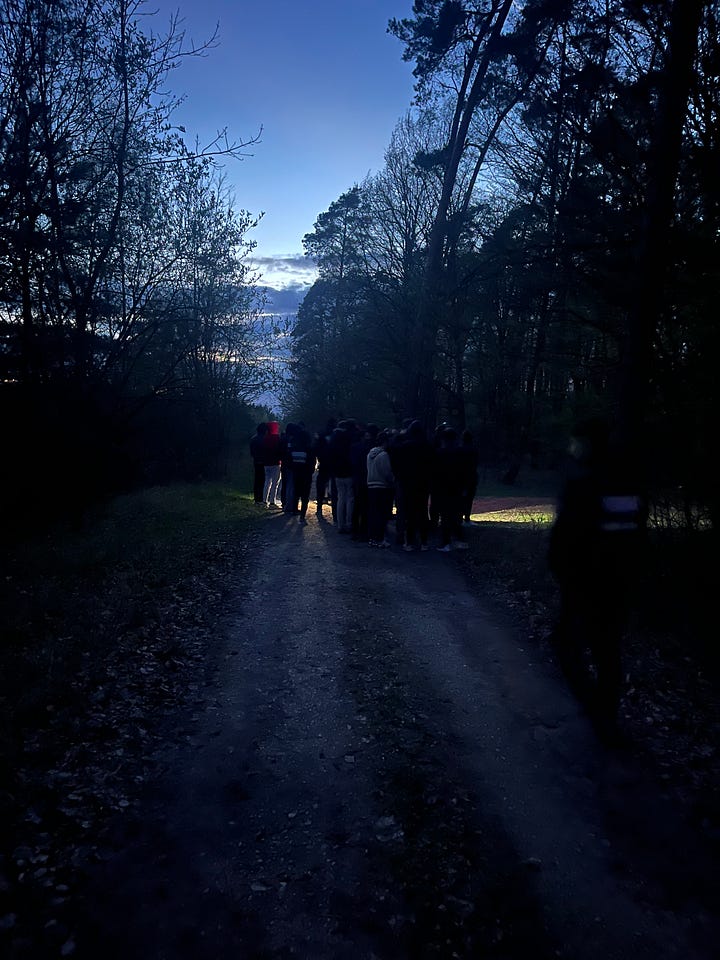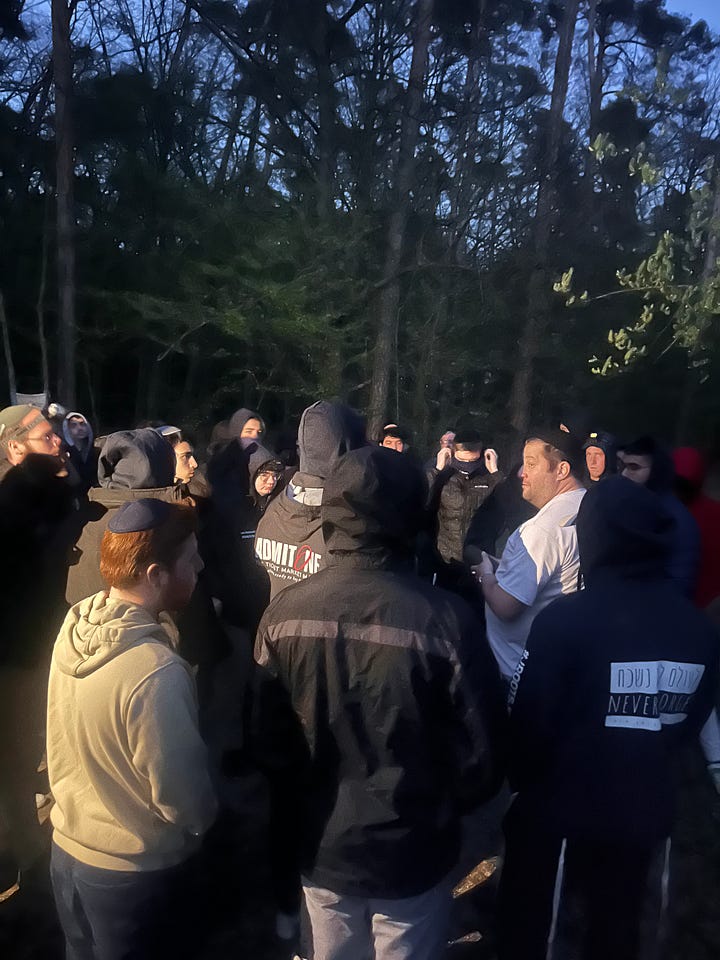Where Was God in the Holocaust (And on October 7)? [Part 2]
I don't know. But we must now make a binary choice: God either is or isn’t.
Dear Healthy Jew,
Last week we asked hard faith questions about the Holocaust, October 7, and all the other tragedies that our nation has suffered for millennia.
We learned that the answer isn’t to shrug our shoulders - “I don’t know and I don’t care” - but to sincerely search for God from within the pain and not-knowing.
Today we’ll begin the search, and next week we’ll continue it some more.
On most days, I manage to keep God at arm’s length.
I wake up, get dressed, and wash my hands according to Jewish law, mostly by rote.
Then I pray, hopefully with some amount of concentration, and get on with my day. I’ll learn Torah, work, relate with people I like and don’t like, and care for myself hopefully with the intent of being healthy so that I can know and emulate God.
When it’s all over, I go to sleep, wake up the next day, and repeat.
How much is my life really about and together with God?
Is God really the center of my world, or is it actually all about me?
I’m embarrassed to say that I think about God far less than I talk about God, and I genuinely care about God even less than I think about God.
I have sparks of sincerity here and there, but most of my life is just that: my life, not God’s. My ego keeps God in check.
I recently joined Yeshivas Lev Hatorah’s Poland trip, where we visited, among many other places, the gas chambers and crematoria of Auschwitz, Madjanek, and Treblinka.
We also stopped by freezing forests where the Nazis shot thousands of Jews into open pits. Late one night we stopped by the clearing at Las Krazel where they burned Jews alive with the chemical reaction of water and lime.


It was an intense experience. Most of the time I worked to simply be present, facing the grisly scenes and my reactions to them with an open mind and heart.
Sometimes my thoughts and feelings went to God, and Job’s turmoil loomed large. When that happened, I noticed a shift inside me - I can’t hold God at arm’s length anymore.
I’m backed against a wall, faced with a stark choice between two opposite possibilities:
There is no God who cares about the world and runs it justly. Even if there is a God, He certainly didn’t choose the Jewish people as His personal nation. If anything, God is the biggest antisemite around.
God cares about me and runs the world with justice, and this is how his justice sometimes looks. For now, my questions all remain, but they won’t change the awe-inspiring and humbling fact that God acted here in justice just as He acted with love when He redeemed us from Egypt and split the Red Sea.
I hold no judgment against someone who chooses the first option. It makes lots of sense.
But I’m also free to choose the second option. And if I zoom out and look at the larger picture of Jewish history, and take a deep look at my Jewish identity (which, if anything, the Holocaust taught that I can’t escape), I might find some good reasons to choose this way.
For example:
Our nation has survived and thrived for over 3,000 years in some of the best and worst conditions known to mankind. God explains why: “For I, God, am unchangeable, and so too the sons of Yaakov (Jacob) will never be annihilated” (Malachi 3:6). As the Rambam explains this verse, God extended His eternal existence to include you and me (Letter to Taiman pp. 125).
God gifted us with one of humankind’s most remarkable documents - the Torah - a breathtakingly beautiful, eternally relevant code of living that provides order and purpose both to individual people and society. In truth, it’s not only a document, but the direct experience of knowing God and emulating God’s ways.
Every year during the Days of Awe, Jews spend dozens of hours reciting prayers and poems hoping for a moment of awakening to the fact that all our choices make a difference and must be accounted for.
And every year during the period of mourning over the Temples’ destruction (now!), Jews fast for two days (not consecutive, don’t worry) and recite hours of mournful liturgy, hoping for a moment of yearning for closeness to God.
These formal rituals are important, yet often feel somewhat artificial. It’s difficult to feel something on a predetermined day just because I read a text that’s supposed to make me feel that way.
But when we visit the sites where God acted in justice with unbearable intensity and unfathomable wisdom, if we choose to accept God’s existence, then all those days in the synagogue are naturally condensed into a single, raw experience of both awakening and yearning.
When facing tragedies like the Holocaust and October 7, life can’t go on as before, with a little of God and lots of me.
One of us must budge, because God is either everything or nothing.
Next week we’ll conclude this series by taking a close look, based on God’s own answer to Job, at where accepting that God is everything might take us.
Thank you for reading Healthy Jew.
Here are 2 great paths to continue the journey:
Also check out this intro and index to explore hundreds of posts about our 3 Healthy Jew topics: Wellness with Wisdom, Land of Life (Israel), and Sensible Spirituality.
Finally, always feel free to reach out here with any comments, questions, or complaints:
I look forward to hearing from you!
Be well,
Rabbi Shmuel Chaim Naiman




![Where Was God in the Holocaust (And on October 7)? [Part 1]](https://substackcdn.com/image/fetch/$s_!E5Z7!,w_140,h_140,c_fill,f_auto,q_auto:good,fl_progressive:steep,g_auto/https%3A%2F%2Fsubstack-post-media.s3.amazonaws.com%2Fpublic%2Fimages%2F0606edb5-3f3d-4293-9391-d2d8a2737cde_2048x1365.heic)



Thank you for this post. I really appreciated the video especially the yeshiva boys dancing in that place.
I was just talking about this notion of crying out. When will we have cried out enough for Hashem to change our collective Din?
I thought about Moshe and his stutter. Why, when he did so much for so many, was he plagued by a stutter until his death? As you know, he never cried out for this He never asked for this remedy from Hashem who loved him so much and certainly would have granted it.
In this time of Av. In this time of suffering. May our crying out be enough to change the Din for all Am Yisrael.
You explain eloquently. I tried saying something similar:https://open.substack.com/pub/liba/p/nothing-makes-sense?r=fxgvw&utm_medium=ios